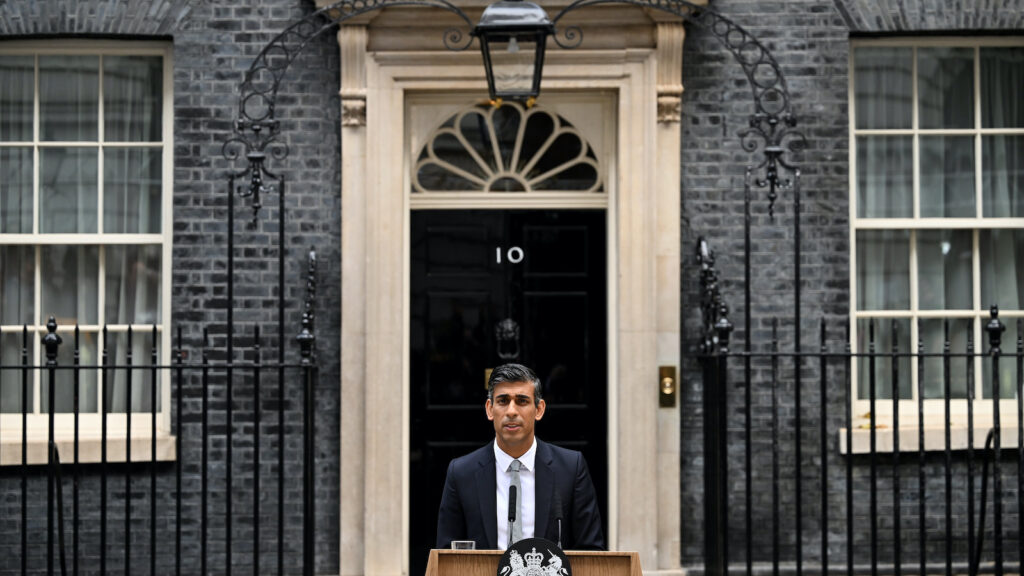What Will the City of London Look Like in 2 Years, Post Brexit?

The Waterloo Bridge sits over the River Thames in London with the City of London financial district in the background. Even though a Brexit trade deal was agreed upon, equivalence is looking less likely.
Photo: Ben Stansall/AFP via Getty Images
In the next week or so, the EU and U.K. are due to sign a Memorandum of Understanding on financial services and the future role of the City of London within Europe’s financial sector.
Since Brexit, London’s average share trading activity has fallen by half, with Amsterdam overtaking London as the largest share trading center in Europe. But despite the symbolism of this, most traders, brokers and asset managers have remained in London.
Sarah Hall is a senior fellow at UK in a Changing Europe and a professor of economic geography at the University of Nottingham. In a two-part series, she examines the future of London as a financial center. Today, she discusses the city’s role within Europe, and tomorrow, the City’s potential for growth outside the EU.
HALL: Going back to World War II, London has dominated Europe’s financial centers and has vied for the global top spot with New York. With Brexit, some market activity has clearly moved from London to Europe, such as share trading, and these moves will continue. Asset managers are setting up offices in the EU, for example, to be able to access the EU market.
But it looks increasingly likely that they are not all going to go to the same European financial center. London is losing business, but it’s losing it to a number of European cities, and because of that fragmentation effect within Europe, that means that, although London is smaller, it’s likely to still dominate.
Without Passporting, the City Needs Equivalence Rights to the EU
While the U.K. was a EU member state, financial institutions in the city could “passport” from their U.K. base into the EU — they didn’t require additional regulatory clearances in the member state they wanted to sell into. So you could essentially run your European operations out of London.
Without passporting, the U.K. needs to rely on equivalence decisions, which is when the EU decides that a third country’s regulatory regime is equivalent to its own. At the moment, the U.K. has received only two — time-limited — equivalence decisions from the EU and only in areas that might be seen as systemic financial risks. Irish security settlement is one of those.
The U.S., for example, has more equivalence decisions with the EU than the U.K. currently has, and Singapore does as well. So, equivalence is the part of the jigsaw that’s missing at the moment for the majority of the financial services sector in the U.K.
BRINK: How likely do you think it is for the City of London to get these equivalence deals?
HALL: If you’d asked me that question this time last year, I would have said that a trade deal would make equivalence decisions quite likely. But what’s happened in the past three months is that it’s become increasingly clear that, even though a trade deal was agreed upon, equivalence is looking less likely.
The U.K. has already granted equivalence to the EU in a number of areas. It did that in November last year. And theoretically, given that the U.K. was in the EU single market and therefore had the same regulatory regime as the EU, there shouldn’t be a reason for the EU not to grant equivalence. However, Mairead McGuinness, the EU’s financial services commissioner, has been quite clear that the EU is not going to rush into equivalence decisions.
Equivalence Is Becoming Increasingly Politicized
Equivalence has become increasingly politicized, and the EU is looking closely for any signs of regulatory divergence from the U.K. And the potential for divergence is making them wary about granting equivalence.
Another dynamic that’s playing out is that, for some member states such as France, there is an appetite to see if they can attract some of the financial services activity from the U.K. to the EU.
There probably isn’t uniformity within the EU on building up its own financial services, therefore, for some member states, attracting financial services after Brexit would not be in their top five most important areas.
BRINK: What does passporting have that equivalence doesn’t?
HALL: It’s a good question, because although equivalence would be the mode of market access that the U.K. could use, it’s only granted in specific areas of financial services. So it relates to particular regulatory areas, like security settlement, for example. It’s not a blanket decision.
There are some parts of financial services where equivalence is not available, such as retail banking. There isn’t an equivalence regime available for retail banking.
Also, it’s not permanent. So the EU is able to withdraw its equivalence decisions with 30 days notice. So, an interesting question is: How valuable is equivalence, given that it’s not the same as passporting? In some ways, equivalence can be thought of as a perishable good for financial services in the U.K.
By that, I mean that the longer it isn’t granted, and the more that firms plan their operations without equivalence, the less valuable an equivalence decision would be. Because it’s unlikely that they would start to unpick some of the changes that they’ve made to operate now, in the absence of equivalence.
The EU Is Intent on Building Its Own Financial Services
BRINK: How serious do you think the EU is about wanting to build up its own financial services?
HALL: There probably isn’t uniformity within the EU on this. So for some member states, attracting financial services after Brexit would not be in their top five most important areas. Member states like Greece, for example, or Portugal, are not that focused on U.K. financial services.
But for other member states, there is a real appetite to do so. President Emmanuel Macron is definitely interested in the prospect of Paris being able to develop its financial services center.
But, actually, the more involved politicians become in trying to do that, there is a risk that that center will be less likely to attract business. What financial services firms value in financial centers is a stable regulatory environment, and a regulatory environment in which the regulators may stand up to wider political trends.
So, it’s quite interesting that Amsterdam and Dublin seem to have done well so far, in terms of attracting business in a slightly less politicized regulatory environment.
The Fragmentation Effect
BRINK: And what about the Germans?
HALL: For Germany, there’s a wider issue that relates to the state of capital markets in the EU. Germany is a quite heavily bank-based finance regime, as opposed to capital markets, which are more dominant in the U.K. And there’s been concern for a while in the EU about the under-use of capital markets and the lack of liquidity in European capital markets.
So Germany is interested in what financial markets could or should be doing to support corporations in Germany. It’s quite likely that banks, multinational banks, may use Frankfurt as their European base. And that reflects the point that I made earlier about the fragmentation of finance across Europe and that there are signs that different types of activity are going to different cities.
Banking is not exclusively, but is quite significantly, targeting Frankfurt. Whereas asset management seems to be more interested in Luxembourg and Dublin as potential sites for relocation. There’s obviously share trading in Amsterdam.
Paris seems to be trying to promote itself as a full-service financial services center, and that’s a bit different to those other European centers.








